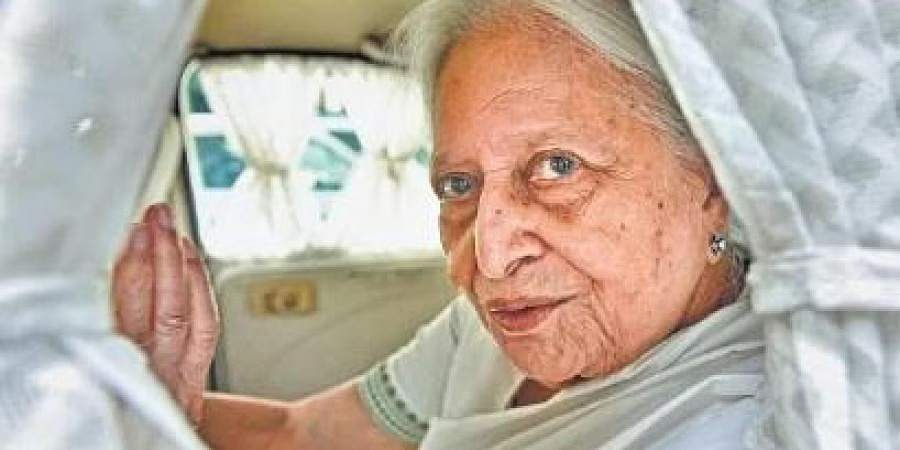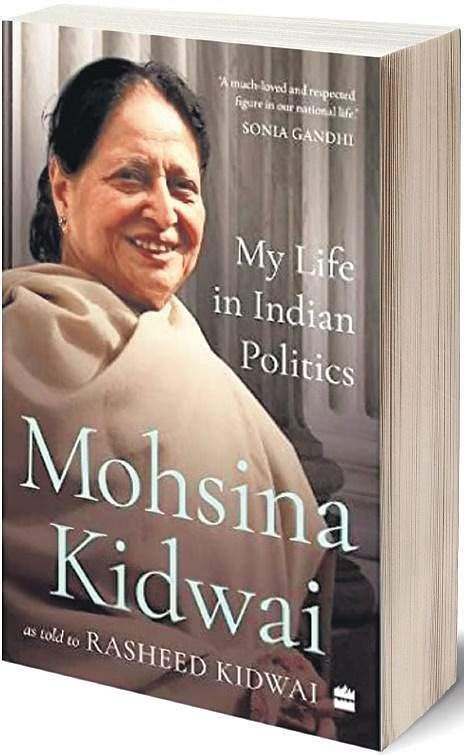Barabanki, UTTAR PRADESH:
My Life in Indian Politics is co-authored by Mohsina and journalist Rasheed Kidwai.

Mohsina Kidwai calls herself a reluctant writer. Despite that, the 90-year-old politician, who has been one of the leading figures of the Indian National Congress (INC), felt it was time to pen her memoir after observing certain shifts in the political climate of the country. “Everyone has a book in them and perhaps I am no exception. I was a reluctant writer, often wondering, weighing over a range of political, ethical, and personal issues. But as I became less active in public life and saw various trends and shades in our country’s polity, I firmed up my mind to write my memoir.
This book is a story of my life but in many ways, it is also a journey of our post-Independence beloved country. As a political worker, it is clear to me that challenges have always been multiple and intricate but not unsurmountable,” says the former politician.
My Life in Indian Politics, the book in question, is co-authored by Mohsina and journalist Rasheed Kidwai. Rasheed took up the project to co-write the memoir because he felt Mohsina’s story is an interesting one to share. “Normally there are various ways that books of eminent political personalities are written. I have authored a few independent autobiographies of political figures. This was the first time I was dabbling in a joint venture. Mohsina spoke to me at length about her life and her career. Essentially, the book is the narration of her life carved by a wordsmith, which was my role. She has been a participant in Indian politics for over six decades, I felt this was a fascinating project to be a part of,” says Rasheed, who ensured that Mohsina approved every word in the book.
Throughout her career, she always believed that Muslims can live harmoniously in a multicultural, independent, and secular Indian society. During Rasheed’s days spent in close proximity with Mohsina, he noticed her being disturbed at the present political and social situation our country finds itself in. “She has greatly exercised her critique of the current political identity because this is not the idea of India that she cherishes. In her career in Uttar Pradesh (UP), she won elections from Azamgarh (Eastern UP) and Meerut (Western UP).
Anyone remotely connected with the socio-economic condition of UP and the caste matrix would vouch that finding acceptability in these two diverse regions is a rather insurmountable task. But today, it is difficult for a Muslim politician to do that. We can see that the number of Muslim candidates has been on a steady decline and you don’t see such examples anymore. Mohsina was never looked at as a Muslim candidate even though she is an ardent practitioner of Islam,” Rasheed says, adding that she had always preferred being judged as an Indian, and her core electoral team always had a mix of people from different communities.

Mohsina is known for her assessment of the INC. Rasheed believes that if at certain times the political leadership had heard her out, then perhaps the history of the party might have been different. “She had opposed former PM PV Narasimha Rao’s politics, not just about his handling of the Babri Masjid case but several other things. She also had a different view on the Shah Bano case. She stood firm with what she thought was right even if her party didn’t agree,” says Rasheed.
Hailing from a conservative, aristocratic Muslim family of Awadh, Mohsina holds the distinction of winning Lok Sabha thrice — in 1978, 1980, and 1984. According to noted French scholar Christophe Jaffrelot, Muslim women face discrimination in a double bind: for their religion as well as their gender.
Data suggests that barely 20 Muslim women have made it to the Lok Sabha among nearly 9,000 MPs voted since 1951. The grounds for discriminating Muslim women are still a prevalent reality. Rasheed feels Mohsina’s memoir can come as a comforting account of hope for fellow Muslim women thinking about venturing into politics.
“The representation of Muslim women in politics is still marginal. Even though some might argue against it, democracy is all about numbers. With the meagre numbers at hand, how can you justify the representation? Her story is about courage, conviction, and integrity. For example, when she retired from politics in 2016, she did not have a house in Delhi. There are so many examples of people with much shorter duration in politics having houses everywhere. She never did despite being the Housing Minister for the country. That’s how a political leader should be,” concludes Rasheed.
source: http://www.indulgexpress.com / The New Indian Express – INDULGE / Home> Society / by Tunir Biswas / November 08th, 2022








